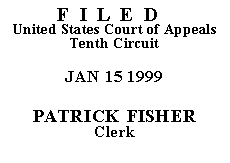 UNITED STATES COURT OF APPEALS
UNITED STATES COURT OF APPEALS
 UNITED STATES COURT OF APPEALS
UNITED STATES COURT OF APPEALS
TENTH CIRCUIT
| CITY OF LAS CRUCES, | |
| v. | No. 97-2272 |
| EL PASO ELECTRIC COMPANY, | (D.C. No. CIV-95-385-LCS)
(D.N.M.) |
ORDER AND JUDGMENT(*)
Before SEYMOUR, Chief Judge, BALDOCK, and BRORBY, Circuit Judges.
A long-term franchise agreement between Plaintiff City of Las Cruces (City) and Defendant El Paso Electric Company (EPE), under which the City allowed EPE to use City rights-of-way to distribute electricity in exchange for 2% of EPE's gross revenue generated within the City, expired in March 1994. The City wished to renew the agreement on a month-to-month basis while it explored options for obtaining lower electric rates within the City, including the option of condemning EPE's distribution system and establishing a municipal electrical system. When the parties could not reach a new agreement, EPE ceased paying the 2% franchise fee to the City, although EPE continued to collect the fees from its rate-paying customers within the City and report the fees as an allowable expense to the regulatory authorities.
To make a long story short, litigation (based on diversity of citizenship and New Mexico law) ensued, in which the City sought recovery of the unpaid franchise fees from EPE.(1) After much pretrial wrangling, the magistrate judge, sitting by the parties' consent, held a bench trial on the City's claim that EPE had been unjustly enriched by withholding the franchise fees. Throughout the litigation, EPE's principal, though not sole, defense was that the City's exclusive remedy under New Mexico law was an action against EPE for inverse condemnation. Pursuant to Fed. R. Civ. P. 52(a), the magistrate judge entered findings of fact and conclusions of law, and held that the City was entitled to payment of the 2% franchise fee collected but withheld by EPE.
On appeal, EPE offers three reasons why the magistrate judge's decision is in error. First, EPE continues to claim that the City's sole and exclusive remedy under New Mexico law is inverse condemnation. In the alternative, EPE claims that the remedy of unjust enrichment is improper because the City gave EPE permission to continue to use the City rights-of-way after contract negotiations failed. Third, EPE claims the damages awarded to the City permit a double recovery because the recovery period ignores EPE's condemnation counterclaim against the City. Our jurisdiction arises under 28 U.S.C. § 1291 (pursuant to the magistrate judge's Rule 54(b) certification). We review the magistrate judge's findings of fact for clear error and his conclusions of law de novo. Rascon v. U.S. West Comm., Inc., 143 F.3d 1324, 1329 (10th Cir. 1998).
We have carefully reviewed both the parties' briefs, and the record on appeal. Finding no reversible error, we affirm substantially for the reasons set forth in the magistrate judge's Memorandum and Order of May 16, 1997. Furthermore, because we conclude there is adequate precedent in decisions of the New Mexico Supreme Court to support the magistrate judge's decision, we deny EPE's Motion for Certification of State Law Questions.
JUDGMENT AFFIRMED; MOTION FOR CERTIFICATION DENIED.
Entered for the Court,
Bobby R. Baldock
Circuit Judge
*. This order and judgment is not binding precedent, except under the doctrines of law of the case, res judicata, and collateral estoppel. The court generally disfavors the citation of orders and judgments; nevertheless, an order and judgment may be cited under the terms and conditions of 10th Cir. R. 36.3.
1. In a companion case, City of Las Cruces v. El Paso Electric Co., CIV-95-485-LCS (D.N.M. 1995), the City sought a declaratory judgment that it possessed the authority to condemn EPE's electric distribution system within the City. The district court certified the issue to the New Mexico Supreme Court which declined to accept certification because a 1997 amendment to N.M. Stat. Ann. § 3-24-1 rendered the issue moot. That amendment provides express authority to the City to condemn privately-owned electric facilities for use in the operation of a municipal utility.